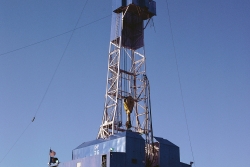The state Department of Conservation has created a blueprint for a potential new set of guidelines related to hydraulic fracturing for oil and gas companies employing or that are considering using the controversial oil extraction technique.
The draft guideline, obtained by the News on Dec. 18, cover required data that drilling operators would have to submit prior to beginning hydraulic fracturing, which would be sent to the corresponding regional water quality boards or agencies with jurisdiction within 10 days of beginning hydraulic fracturing operations.
Included in this data would be the operator’s name and contact information, the name of the oil company and the number of the well, the estimated true vertical depth of the well and anticipated distance of the fracture, as well as the anticipated volume and pressures of the liquids that will be injected into the well.
Other proposed draft requirements include testing all cement casing strings and tubing strings that will be utilized in the drilling process for 30 minutes as well as all surface equipment, and requiring the operator to run a fracture analysis test to verify that no fluids or hydrocarbons will enter into an area that contains water.
The regulations come at a time when the debate of hydraulic fracture, commonly known as fracking, continues to be a heated topic of discussion. The process involves injecting large quantities of water and chemicals into petroleum or shale into rock formations thousands of feet rocks beneath the surface.
Proponents of the oil extraction procedure believe it will lead to a safer method of oil drilling and eventually lessen the nation’s dependency on imported oil.
Those who are in opposition argue that not only is it unregulated in California but it is also unsafe and unhealthy from an environmental standpoint.
Earlier this year, Culver City became one of the first municipalities to formally ask the Legislature to ban fracking through a resolution. Former Assemblywoman Betsy Butler (D- Marina del Rey) sponsored a bill that would have regulated the controversial procedure but the bill did not make it out of an Assembly committee.
On Oct. 16, fracking opponents filed a lawsuit in Alameda County Superior Court against the California Department of Conservation, Division of Oil, Gas, and Geothermal Resources.
The legal actions accuse the aforementioned agencies of failing to consider or evaluate the risks of fracking, as required by the California Environmental Quality Act (CEQA).
The nonprofit environmental law firm Earthjustice filed the lawsuit today on behalf of the Center for Biological Diversity, Earthworks, Environmental Working Group and Sierra Club.
“Right now, the people of California don’t know where or when the drillers are fracking, what chemicals they are using, what pollutants they’re releasing into the air and water, and what other risks they are taking. That’s because the state hasn’t required them to disclose any information on fracking activities,” said Earthjustice attorney George Torgun. “Public outcry has finally forced the department to take a look at fracking. They’ve held workshops and say they’re considering regulations. But the problem needs attention now before too much damage is done.”
“By turning a blind eye to fracking, California officials are letting oil companies endanger our air, water and climate,” added Kassie Siegel, director of the Center for Biological Diversity’s Climate Law Institute. “If the oil industry fracks the 14 billion barrels of unconventional oil in the Monterey Shale, they’ll light the fuse on a carbon bomb that will demolish California’s efforts to fight climate change.”
The Division of Oil, Gas, and Geothermal Resources, which falls under the Department of Conservation, is the state agency responsible for oil and gas regulation.
Plains, Exploration and Petroleum, which operates the Inglewood Oilfield near Culver City, released its hydraulic fracturing report on Oct. 10.
“The debate about hydraulic fracturing both locally and nationally has been predominantly driven by hypothetical fears. This study will provide empirical data from two separate high volume hydraulic fracturing completions operations that were conducted at the Inglewood Oilfield,” PXP Vice President Steven Rusch said. “The local community and policy leaders will have tangible monitoring results they can use in responding to policy questions about domestic oil and gas production.”
Dr. Daniel Tormey of Cardno Entrix, who has been a geologist and geochemist for 23 years, conducted the study. He said fracking in the Inglewood Oilfield “has no measurable effect at the surface.”
Critics of fracking claim that it can also be the catalyst for earthquakes and Culver Crest resident Dr. Suzanne DeBenedttis has questioned whether it has caused infrastructure damage, included water mains that have burst.
Culver City is in the process of drafting its own oil drilling ordinance. The city’s elected leaders are seeking to have a section of the ordinances that address fracking.
The complete list of regulations can be found at www.conservation.ca.gov.

